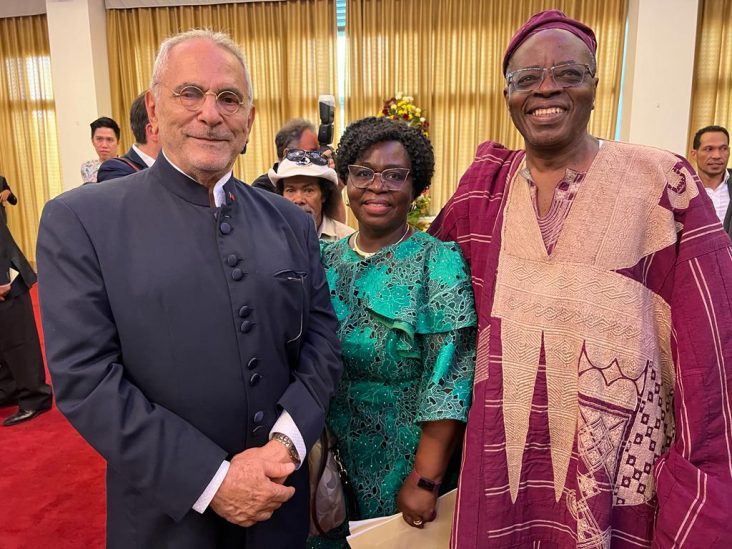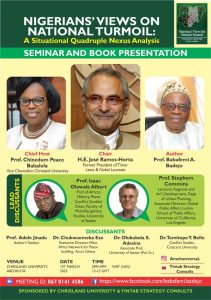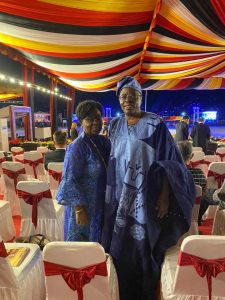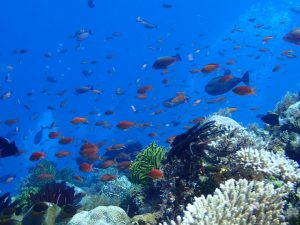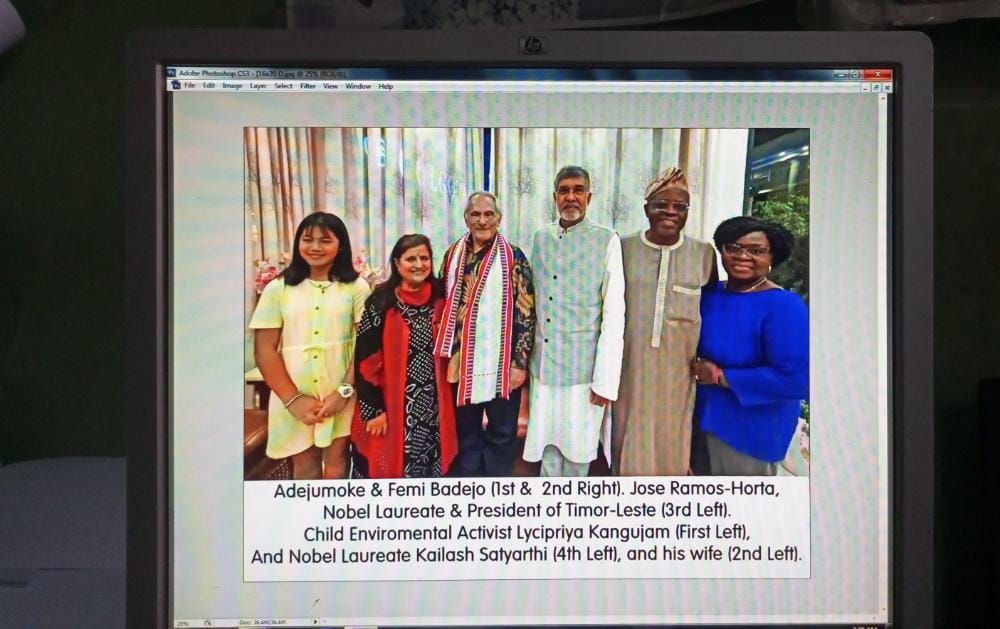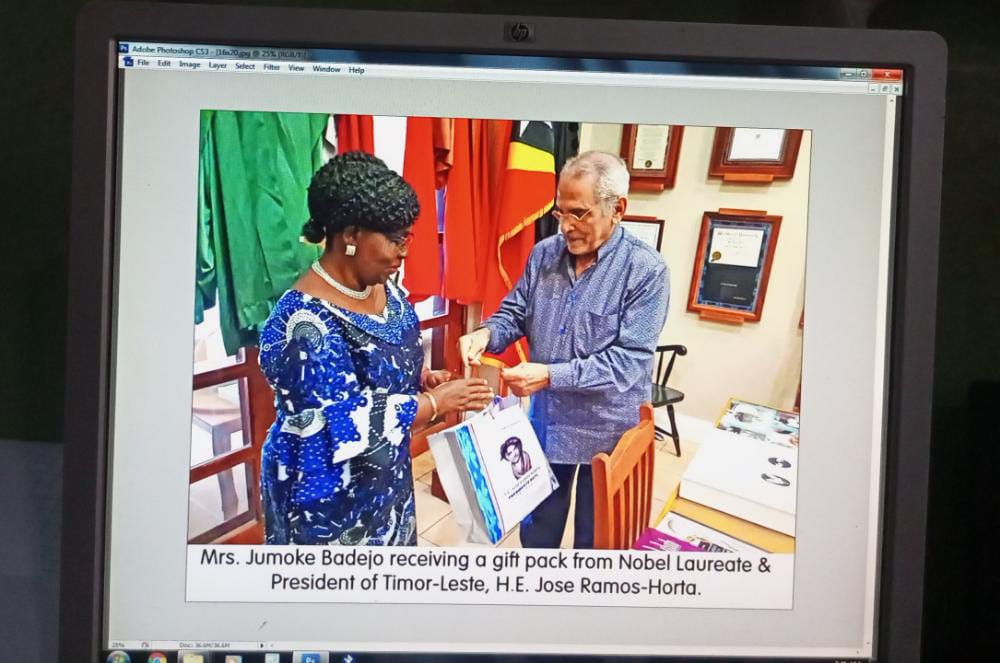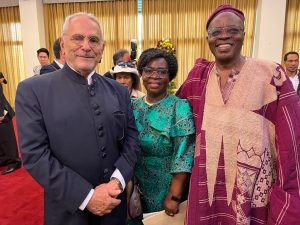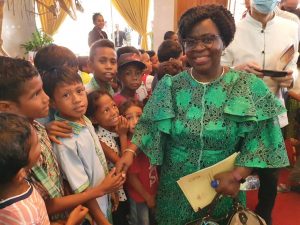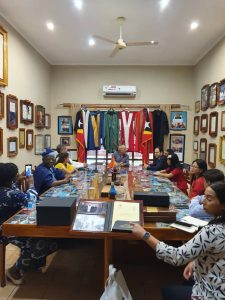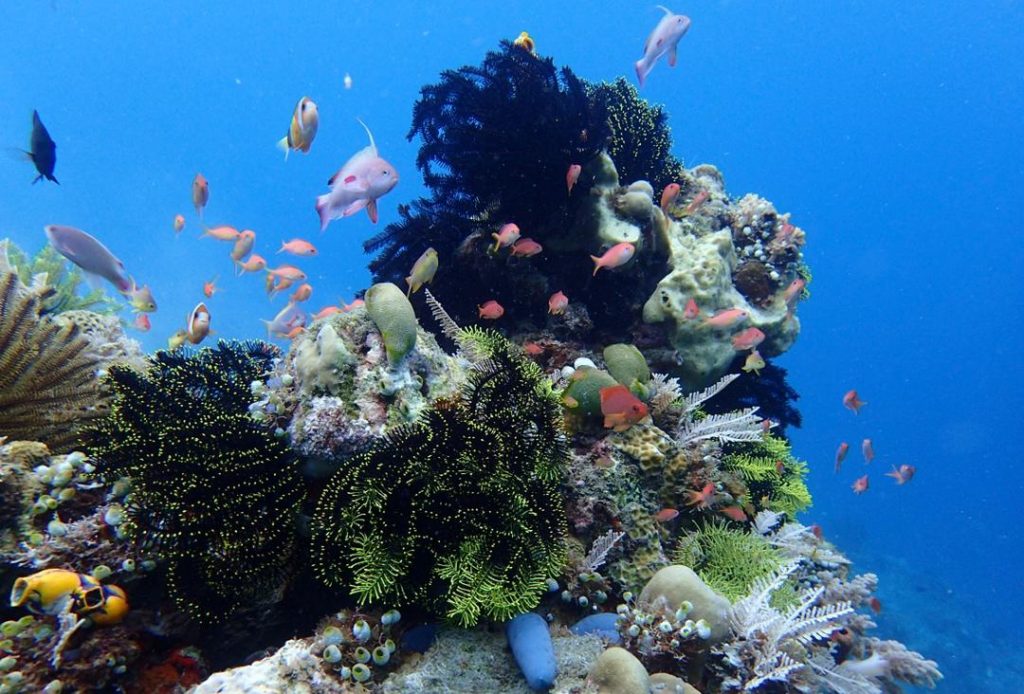Hope in Timor-Leste: Musings from the 2022 Presidential Inauguration
By
Babafemi A. Badejo, Ph.D.
My wife and I had the pleasure of attending the inauguration of H.E. José Ramos-Horta (JRH) as a second-term President of Timor-Leste (East Timor), after a ten-year hiatus. I was fortunate to build a relationship with JRH when I served as his Chief of Staff during his short sojourn at the United Nations, trying to build peace in Guinea-Bissau. In addition, my wife and I had hosted him in Nigeria during an official visit to President Goodluck Jonathan; and in March 2022, amidst his busy campaign schedules, he was available to chair the official release of my latest book, at Chrisland University, Abeokuta, Nigeria.
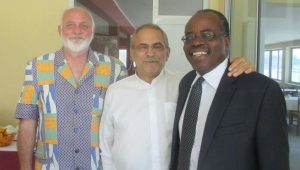
With Russel J. Hanks, Director, US Embassy, Bissau, Guinea-Bissau, H:E JRH, and Self, after a meeting on May 15, 2014 in Dakar Senegal.
I learned about East Timor in 1981 as a Ph.D. student at UCLA during my field research in Pakistan. The exposure came from an acquaintance from Irian Jaya now West Papua. He educated me on the history of colonial exploits in the Islands of Southeast Asia and the general turmoil affecting the region, including in East Timor.
At UCLA, I was part of a small group of idealists devoted to building African and African-American relationships as well as using this to campaign for the freedom and dignity of the black man, including in South Africa. Every Saturday morning, with Adeyinka, my 3-year-old daughter, we joined others in front of the Bank of America at Westwood, Los Angeles, demonstrating for American divestments from apartheid South Africa. The subjugation and denial of freedom to people anywhere was of interest to me. But in Pakistan, I was like a fish out of water without any organisational capacity to help my interlocutor beyond giving a hearing and words of encouragement.
Working for the United Nations got me aware of the organisation’s unique role on freedom and nation-building in East Timor. From the early 16th century, the Portuguese introduced the colonial style they had adopted in Africa. The Portuguese normally started with a trading post that effectively resulted in an almost 500-year colonisation of Timor Island. Though, in 1749, the Dutch who had established a presence in the general area took West Timor. The recognition of Indonesian sovereignty by the Netherlands in 1949, saw Indonesia stepping into the erstwhile rights of the Dutch.
With the overthrow of the right-wing Portuguese government on April 25, 1974, Portuguese colonies were freed and nationalist movements that had been campaigning for freedom scrambled to form governments. There was an initial coalition by the two largest parties: the Revolutionary Front for an Independent East Timor (Fretilin) and the Timorese Democratic Union (UDT), however, the coalition broke down acrimoniously. By October 1975 Indonesian invasion commenced from West Timor and was formally declared on December 7, 1975. This only ended in October 1999, when a plebiscite overwhelmingly supported independence as opposed to autonomy under Indonesian rule. The result of the plebiscite resulted in another round of killings and burnings by Indonesia in East Timor.
The UN took over the administration of East Timor (the name changed to Timor-Leste on September 27, 2002), after the referendum till May 20, 2002, when the Timor-Leste flag was raised and Xanana Gusmao who had led the internal resistance, (that was actively supported by Catholic Bishop Carlos Belo, Nobel Laureate 1996), became the President. JRH, who shared his Nobel with Bishop Belo for leading the resistance from outside, became the Foreign Minister. He subsequently served as Prime Minister and President from 2007 to 2012. He lost a re-election bid. He left the scene to serve on international assignments but was wooed back to contest the 2022 presidential election which he won with a landslide.
Our invitation was dual: First to witness JRH’s swearing-in, and second, to participate in the colourful 20th Anniversary of the raising of the Timor-Leste flag. We left Lagos on Qatar Airways, on Monday, May 16, 2022, for Kuala Lumpur via Doha. The challenge we faced at the Qatar Airways check-in at the International Wing of the Murtala Mohammed airport at Ikeja was immense and it looked like we would not be allowed to travel. The unfriendly attitude of Nigerian officials at the airport, petty extortions, and an entitlement mentality, which at times come by way of begging for tips, still have to be addressed.
We spent 17 hours getting to Kuala Lumpur. We did not take transit visas since there was an airside transit hotel before immigration that charged on a six-hourly basis. We were to spend 17 transit hours at the beautiful Kuala Lumpur International Airport (KLIA). My British secondary school teacher/school father, Tony Finch, made a lot of difference in my worldview. He introduced me to critical/practical thinking. He settled in Malaysia after arriving there as a teacher in 1979. He was travelling on the same day. So, we were to have dinner at my hotel as part of using our plentiful transit time. Unfortunately, his ticket was wrongly indicated to commence at the KLIA. He learned the mistake on arrival to check-in and had to rush to KLIA 2 which was 10 km away. So, we did not meet.
We ended up spending approximately 26 hours at KLIA because of a faulty aircraft to start with. When a replacement aircraft arrived from Daca, the crew had to change shifts. When the new crew arrived, we again learned no rated pilot was available. The wait and delays did not go to waste, as I made some good friends during the process: Adama Dieng, a respected Senegalese Jurist, and Heinrich Kaiser, a Professor from a California College. The three of us were friends of the President-Elect. Finally, the pilot arrived as we munched on the free Mcdonald’s burger offered to appease passengers. And with another four hours and fifteen minutes of flight, we landed in beautiful Dili smoothly. Very picturesque from the air.
The swearing-in was billed for 11 p.m. on May 19. The event was at an open space that was built for the visit of Pope John Paul II in October 1989, when the Pontiff called on Indonesia to respect the rights of Timorese who by the way are 98% Catholic. Much of the Swearing-in Ceremony was in Portuguese, though three children, including Licypriya Kangujam, the invited child environmental activist from India made passionate pleas in English at the event for the saving of the environment for the next generation.
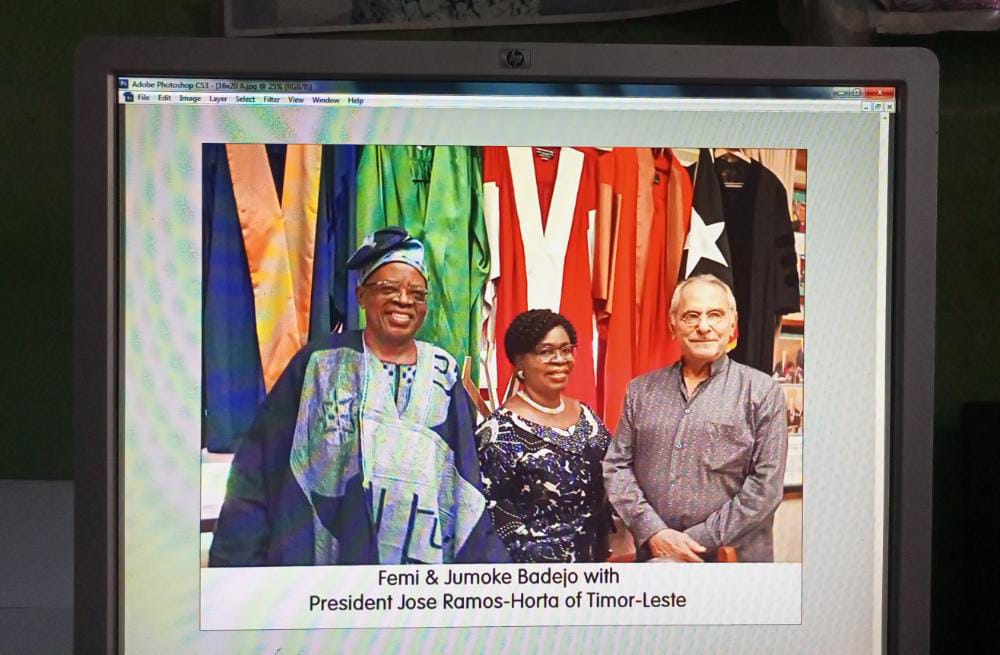 As power changed hands, there was the 21-gun salute to the new Commander-in-Chief by a parade earlier inspected by the outgoing President Francisco Guterres, popularly known as Lú-Olo. The new President, being comfortable in many languages, prepared his speech in English and Portuguese and had liberally shared it on his Facebook page even before the ceremony.
As power changed hands, there was the 21-gun salute to the new Commander-in-Chief by a parade earlier inspected by the outgoing President Francisco Guterres, popularly known as Lú-Olo. The new President, being comfortable in many languages, prepared his speech in English and Portuguese and had liberally shared it on his Facebook page even before the ceremony.
At his first official function on the 20th Anniversary of the raising of the flag on the sunny morning of May 20, 2022, President JRH behaved like his simple José self by ordering the gates of the presidential palace open for all the children outside to come and shake hands with visiting grandparents, from around the world, and partake of the food prepared for the 20th anniversary. The children joyously obeyed and enjoyed themselves. Hawkers of all sorts who with the children had been shut out only listening beyond the fence flocked into the palace grounds. However, the Hawkers of tangerine and oranges, etc were at a disadvantage. Unlike the children, they couldn’t afford to leave their wares to go inside and eat/drink.
Several dignitaries, including Marcelo Rebelo de Sousa, the President of Portugal; David John Hurley, the Governor-General of Australia; Nuno Gomes, Nabiam, the Prime Minister of Guinea-Bissau; Dr. Francis Kai-Kai, the Minister of Economic Planning and Development of Sierra Leone; Ms. Armida Salsiah Alisjahbana, the Executive Secretary of United Nations Economic and Social Commission for Asia and the Pacific (UNESCAP) who represented the Secretary-General; Kailash Satyarthi, 2014 Nobel Laureate and his wife Sumedha; Licypriya Kangujam, etc., willy-nilly shook hands with the children. My wife was all glows shaking hands with the children as I became a celebrity of a sort with children and adults wanting photographs with me, I guess because I was wearing the beautiful Yoruba Alari Aso-Oke I had inherited from my late father. I had worn the Aso-Etu version that was a gift from Yemi Badejo, my brother, on the previous day when we visited the office of the President-Elect. The President went further stating that the palace was too big for one man and that the people are welcome to come and jug at the palace. I later learned they would get free wifi access to the internet as well while on the palace grounds.
Friends of the President in attendance at the ceremonies, aside from the two I earlier mentioned, included: Prof. Boris Tadic, former President of Serbia; Bishop Gunnar Stalsett of the Nobel Committee; Judge Mohamed Abdelsalam, the Secretary-General of the Muslim Council of Elders; Sukehiro Hasegawa who was my senior when we served the UN in Somalia and subsequently led the UN Mission in Timor-Leste; and Peter Thompson, a UK Parliamentarian from Northern Ireland who had collaborated with JRH and I towards the successful 2014 electoral process in Guinea-Bissau.
There were other Envoys and several Ambassadors. I spent qualitative dialogue time with those of Angola to Singapore with concurrent accreditation to Timor-Leste, Amb. Daniel Antonio Rosa and H.E. Martha Mavrommatis, the High Commissioner of Cyprus in Australia. I also met with high net-worth Yohei Sasakawa, Chairman of The Nippon Foundation at the residence of the President. He was accompanied by his Executive Director and a Director of the Sasakawa Peace Foundation. Interesting was their Japanese humility as they took seats in the economy class on our Dili-Kuala Lumpur flight.
From the calibre of attendees, the goodwill the President has built around the world, and the ideas put forward in his inauguration speech, I am confident the country under his watch will pursue robust and rich foreign policy and diplomatic relations. I am positive the country can continue on the path of great values and development in achieving high quality of life for its people serving as an example for many poor countries.
Aside from losses during the second world war, about a quarter of the population was annihilated during the Indonesian occupation. The most famous massacre was the April 25, 1975, Santa Cruz massacre. I was lucky that my friend from my UN days, Ezequiel Saldanha, took us to the burial site of these Timorese heroes, a local market, as well as the Dili city museum. The museum can still use a lot of reconstruction of Timorese history and artefacts. Dageng Liu, a friend, and the World Food Programme Country Director equally spared some time to show us around the city and outside to the hills after a great seafood lunch to a café where there was some education on the sufferings of the Timorese in the hands of the Japanese for supporting Australia during the second world war. Needless to say that Australia was the only Western country that recognised Indonesian occupation – appeasement, some speculate, may have to do with oil and gas in East Timor waters. The café housed the Dare War Museum which was largely virtual. Dageng, an avid diver and underwater photographer had so much to show about the beauty of the marine ecosystem of Timor-Leste.
So much to still learn. Timor-Leste with a small population of 1.3m is a poor country compared to Southeast Asian standards. However, it is one that is trying to avoid the resource curse associated with poor countries with my country being one regularly cited as an example. Timor-Leste decided to follow the Norwegian model by setting up a Petroleum Sovereign Wealth Fund already receiving high returns into government coffers with a current value of around $18 billion. A lot could still be done on agriculture, especially on coffee production on which President JRH called for a worldwide stabilization fund as part of his inaugural address.
JRH is like a younger Mandela given his forgiving spirit. As Foreign Minister, he had recommended that Timorese Presidents pay their respective first foreign visits to Indonesia. It has become a tradition. He told us privately that he would undertake his in June. I had seen him stay at the Indonesian residence when we once were on an official visit to Washington D.C. during our UN days.
It was indeed a great visit to a small country with the potential of having the attention of the world like the UAE is doing today.
* Former Deputy Special Representative of the UN Secretary-General for Somalia, Solicitor and Advocate of the Supreme Court of Nigeria, and Professor of Political Science & International Relations, Chrisland University, Abeokuta, Nigeria.
Click link below to download full story in PDF
